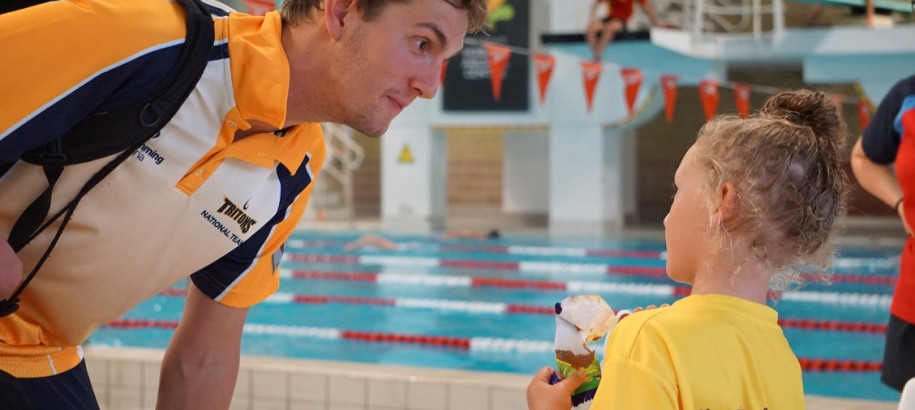
Swimming Tasmania is committed to providing a supportive and inclusive environment to enable people of all abilities to participate, and to develop and enjoy their swimming experience.
- Athletes and Competition
- Classification
- Partners
-
promote blind and vision impaired sports to all members of the community as a worthwhile activity to increase social inclusion and for a sustainable healthy lifestyle;
-
increase the participation in blind and vision impaired sports by all the blind community regardless of age or severity of vision impairment; and
-
advocate on behalf of its members at local, national and international level.
Multi Class (MC) events see swimmers with a range of disabilities competing in the same race. To compete in MC competition swimmers must have an eligible classification.
Swimmers race against the world record time in that event for their classification. Event results are determined using the Multi Class Point Score system. The winner of the race is not always who touches the wall first, but the swimmer who posts the highest point score (i.e. a time closest to the world record for their classification).
Swimmers may be granted certain exceptions to the standard swimming rules to allow for meaningful and fair competition for all swimmers.
For more information please click here.
Classification is used to place athletes of similar ability or function into groups for competition. Classification considers an athlete’s medical condition and physical, sensory and cognitive attributes to group them into classes. In Australia classification is used to ensure fair and meaningful competition at all levels.
Get Classified
There are 16 classes in the swimming classification system which caters for a range of disabilities. Each class has minimum eligibility requirements and swimmers must undergo specific Athlete Evaluation or Eligibility process to obtain a classification. Swimmers receive a class for each stroke discipline, and a prefix indicates which stroke the class applies to;
The prefix S to the class denotes the class for Freestyle, Backstroke Butterfly
The prefix SB to the class denotes the class for breaststroke
The prefix SM to the class denotes the class for Individual Medley
Swimmers with Physical/Functional Impairment (Classes 1-10)
Swimmers are assessed through physical testing and water observations. Muscle strength, movement co-ordination, joint range of movement and limb/trunk length contribute to the allocation of classes. Classes range from swimmers with most significant physical impairment (Class 1) to those with minimal impairment (Class 10).
Swimmers with Vision Impairment (Classes 11-13)
Ranges from Class 11 for swimmers who are blind to Class 13 for swimmers who are legally blind (i.e. acuity less than or equal to 6/60 or visual filed less than 20 degrees).
Swimmers with Intellectual Impairment (Class 14)
Swimmers with an IQ score of 75 or less; with significant limitations in adaptive behaviour expressed in conceptual, social, and practical adaptive skills; acquired prior to 18 years of age.
Swimmers with Hearing Impairment (Class 15)
Swimmers who have a recognized hearing impairment according to the following ICSD standards; deaf, defined as a hearing loss of at least 55dB in the better ear 3FAHL.
Swimmers who have received a transplant (Class 16)
Any person having undergone invasive treatment of a non-cosmetic nature requiring organs and/or tissues (excluding blood) donated by another person.
For more information on the classes and eligibility requirements visit the Multi Class Engagement Portal on the Swimming Australia website here.
National Classification Master List
The National Classification Master List is the official record of all Australian classified swimmers and is managed by Swimming Australia in agreement with classification system partners. Swimming Australia makes public certain classification information to assist athletes, coaches and meet organisers (e.g. swimmer name, state, date of birth, classes and status).
Download the Swimming Classification Master List from the Swimming Australia website here.
Classification Card
The Swimming Australia Classification Card is intended to assist the effective management of Multi Class Competitions. It provides an official record of an individual competitor’s classifications and any applicable rule exceptions. The Classification Card proves eligibility to compete in MC competition or other competition where classifications and rule exceptions are enforced.
The Swimming Australia Classification Card is issued to swimming club members who have an eligible swimming classification. Swimmers should be prepared to present their classification card to meet officials when competing.
Swimming Codes of Exception for Multi-Class Events
Some swimmers are entitled to receive exceptions to the swimming rules and other considerations based on their classification. The exceptions prevent classified swimmers from being disqualified during Multi Class (MC) competition. These exceptions are determined during the classification process and are identified by a system of codes known as the Swimming Codes of Exceptions.
Para Swimming www.paralympic.org/swimming
Official website of World Para Swimming - find out about paralympic athletes, classifications & rules, plus follow the competitive events of this sport.
Deaf Sports Australia www.deafsports.org.au (03) 9473 1191
Deaf Sports Australia (DSA) is the peak body for deaf sport in Australia. DSA manage deaf specific competitions, promote the participation of people with a hearing impairment in sport and manage eligibility for hearing impaired classification (Class 15).
Blind Sports Australia www.blindsportsaustralia.com.au
Blind Sports Australia aims to:
Special Olympics Australia www.specialolympics.com.au
Special Olympics has grown from a backyard camp into a global movement that has been transforming the lives of people with an intellectual disability for almost 50 years. The global sporting community was pioneered by the late Eunice Kennedy Shriver, sister to US President John F Kennedy as well as Rosemary who had an intellectual disability. Today, Special Olympics supports over 5 million athletes in 177 countries.
Read more about the Tasmanian Branch of Special Olympics here: www.specialolympics.com.au/tas



